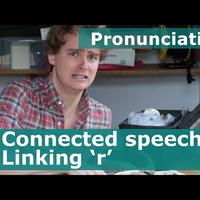6- The linking /r/
Hi, I'm Tim and this is my pronunciation workshop.
Here, I'm gonna show you how English is really spoken. It'll help you become a better listener
and a more fluent speaker. Come on, let's go inside.
Today, we're going to be talking about war. War... what is it good for? Well, as it turns out, it
can be used to help illustrate a feature of fluent speech. As you can see, we write 'war'
with three letters:
w, a, and r,
but when we pronounce it there are only two sounds:
The 'r' in the spelling is not pronounced in the word itself, or if the next word begins
with a consonant sound. But, have a listen to this. We went out and asked people in the
streets of London to name a famous Russian book. This is what they said:
Err, the most famous Russian book I can think of is
Simple, right? Everybody knows War and Peace.
I've never heard of the book War and Peace.
Well, almost everybody. But have another listen
to the way they say it.
The word after 'war' begins with a vowel sound. And in this case, the 'r' is pronounced.
War and Peace; War and Peace. This is called a 'linking r' and it helps to make the words
flow together more smoothly in natural speech. Here are some more examples:
So, you've heard the examples - now it's your turn.
Are you ready to give it a try? Listen and repeat.
How did you get on? Great. Remember, if you
want to read more about this topic please visit our website:
And that's everything from the pronunciation workshop this week. Now, I'm off to do some DIY. Bye.
Can somebody call for an ambulance? Please!

